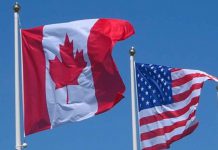
THUNDER BAY – The issue of softwood lumber is heating up. Canada and the United States are sparring over the issues of trade between Canada and the United States have both sides digging in once again.
At risk for Canada and Ontario are tens of thousands of Canadian jobs.
The U.S. Lumber Coalition released the following statement in response to the U.S. Department of Commerce announcement of anti-dumping duties related to Canadian companies dumping Canadian softwood lumber products in the United States. The Department’s decision is a preliminary finding and now the case will be subject to additional investigation before a final decision on the dumping margins is made by the Department in September.
“We applaud the Department of Commerce’s decision to take further action against Canada’s unfair trading practices and restore fair trade for U.S. lumber producers,’ said U.S. Lumber Coalition spokesperson, Zoltan van Heyningen. “For years, Canada has unfairly distorted the softwood lumber market with billions of dollars in support of their producers. This has allowed Canadian producers to dump their product on the U.S. market to the detriment of U.S. manufacturers, as now confirmed by the Department of Commerce. The 350,000 hard working men and women in the U.S. lumber industry deserve a level playing field. We encourage the Department to continue strongly enforcing U.S. trade laws to respond to these unfair practices that have harmed U.S. companies and their workers.”
Premier Kathleen Wynne and Minister of Natural Resources and Forestry Kathryn McGarry issued the following statement responding to the announcement of new duties on Canadian softwood lumber exports to the U.S.:
“The Ontario government will continue to stand alongside forestry workers and businesses – and the communities across the province that depend on it.
“We are frustrated that the U.S. Department of Commerce has decided to impose additional unjustified duties on Ontario’s softwood lumber producers. Ontario and Canadian softwood companies export their products at fair market prices, and these “anti-dumping” duties are protectionism — plain and simple.
“We know that fair and open trade is the best outcome for people and businesses on both sides of the border. We will continue to fight against this “Buy American” mentality that is driving up the price of lumber across the border and continually pricing middle class Americans out of home ownership.
“We are standing with our forestry sector — and the families that depend on it.
“Working through our Chief Negotiator, Jim Peterson, we will continue to advocate for free and open trade for Ontario’s softwood industry, and we will support Ontario forestry businesses by responding to their concerns and vigorously representing their interests in Ottawa and Washington.”
The impact of the new tariffs are likely to hit hard on Canadian workers.
The re-introduction of a second tariff on Canadian softwood lumber exports pushes the industry closer to crisis, says Unifor.

“These tariffs are a slap in the face to the concept of fair trade,” said Jerry Dias, Unifor National President. “It’s President Trump’s gift to U.S. landowners and hundreds of Canadian communities will pay the price.”
The anti-dumping duty announced today by the U.S. government will add to the countervailing duties announced in April 2017. The combined duties on Canadian exports could reach as high at 31%. Conservative estimates suggest that sustained 25% combined duties could yield a loss of 25,000 jobs.
Unifor says that the $867-million forestry industry aid package announced by the Canadian government in May will help cushion the blow, but it is not a long-term solution.
“Our forestry industry needs a new softwood agreement that defends good jobs and strengthens Canadian competitiveness,” said Scott Doherty, Executive Assistant to the Unifor National President. “It’s very unlikely these tariffs will stand up to legal scrutiny, so Canada should bargain from a position of strength.”
In 2002 the U.S. government imposed similar tariffs, but international trade tribunals have consistently over-ruled American duties on Canadian lumber. While Unifor is confident that the new U.S. duties are illegal, it can take years for appeals to be resolved.
Unifor has nearly 24,000 forestry members at 134 employers in every region of Canada. It is Canada’s largest union in the private sector, representing more than 310,000 workers. It was formed Labour Day weekend 2013 when the Canadian Auto Workers and the Communications, Energy and Paperworkers unions merged.



